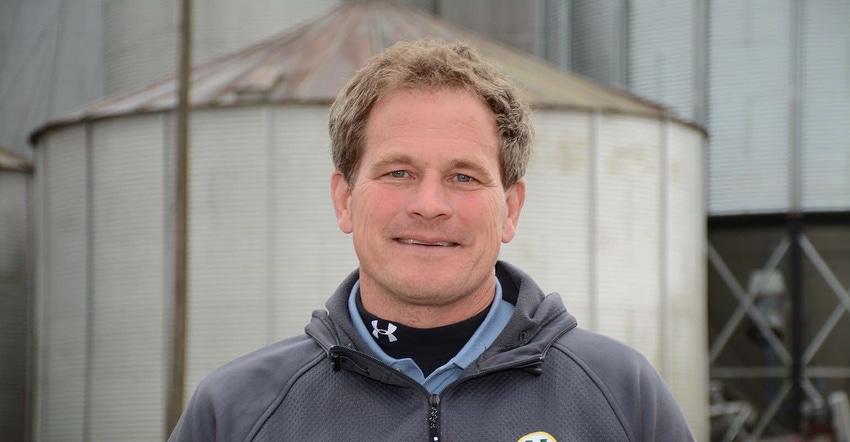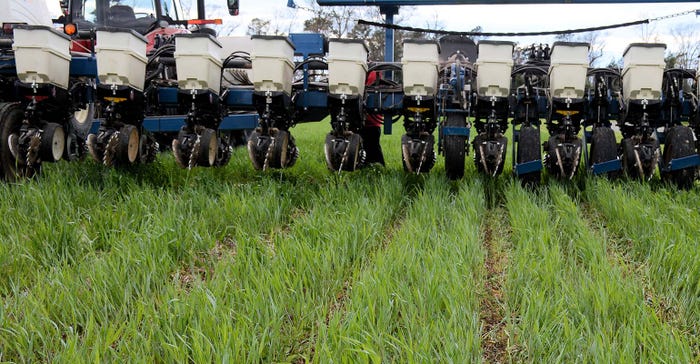
Some farmers see environmentalists as the enemy. Maryland farmer Trey Hill takes the opposite view: he is not only an environmentalist; he is a champion for the environment.
That’s one reason why Bayer named Hill’s Harborview Farms its first ForwardFarming operation in North America last week. The program is intended to foster dialogue and understanding about how food can be grown in harmony with the environment.
For Hill, working with environmental groups starting several years ago opened his eyes to the need for change.
“Going to the environmental groups really helped me learn how other people think,” says Hill, 42, who runs the 10,000-acre operation with his father, Herman Hill, Jr.; mother, Christy; wife, Cheryl; and 14 employees. “By having those environmental conversations, a lot of that has helped transform the way I farm.”
Arch enemies
Hill has found the sweet spot in profitable, yet environmentally-sensitive farming, but the journey hasn’t been simple. Agriculture is the leading source of nutrient and sediment pollution entering the Chesapeake Bay – a sore spot for farmers here and a galvanizing cause for many others. A Pfiesteria outbreak in the Bay resulted in a big fish kill about 25 years ago, and the environmentalists and famers became arch enemies.
“They were against us, we were against them,” recalls Hill. His father said, “We need to get these folks out here. We need to show them what we’re doing and how we’re doing it.”
Maryland and other states passed restrictive measures including mandatory nutrient management plans. Hill adopted no-till, added buffer strips and stopped applying nitrogen in the fall. And, he grudgingly started planting cover crops, motivated by a $45 per acre cost-share program paid by Maryland taxpayers.
“Initially we thought cover crops were a waste of time, but they were going to pay us to do them, so we went along with it,” says Hill. “We wanted to get on their team to show farmers are willing to work with others voluntarily.”
Hill noticed cleaner water after a few years of cover crops. He began working with environmental advocates at the Chesapeake Bay Foundation and Chester River Association. He took a good hard look at the science behind the practices, and began to have a change of heart.
“I began to realize they weren’t out to get me, they just want to know what’s going on,” he says. “I had to admit, yeah, maybe we do pollute a bit. The question is, how much is an acceptable level? No one has any good numbers on this. But we had to start figuring it out.”
That set Hill on a journey to re-examine every farm practice, which has led to successfully planting corn and soybeans into living cover crops, a practice known as, ‘planting green’.

Hill successfully plants corn and soybeans into living cover crops, a practice known as, ‘planting green.’ He sprays the cover crop later, before crop emergence.
“People would ask why not let the cover crops grow? I would say because we always plant into brown dirt,” he recalls. “But a few mistakes later, we’ve learned how to plant green and it’s working great.”
He has set aside nearly 5% of total acres for wildlife habitat. He installed a 300-kilowatt solar array to power the grain system, multiple houses and other farm operations. He is now working with a company to measure and manage the carbon footprint of each farm field.
Now Hill measures the success of his operation not just by how many bushels of corn, soybeans and wheat it produces, but by how effectively it helps the waters of the Chesapeake Bay that surround its fields.
"Everything we do at Harborview Farms has to pass this test," he says. "I have to be able to explain it to my young children, simply and with integrity. That includes the inputs we use, how and why we use them, our treatment of wildlife and the Bay, and the amount of energy we use doing it all. If I can't do that, then it's a signal I have to re-think our practices."
Elite farms
Harborview is now one of 12 innovative, independent farms Bayer has designated to represent practices that are both productive and ecologically smart. Ranging in production from corn and sunflowers in France, to potatoes in Belgium and the Netherlands, to cereals and oilseed rape in Germany, to wine grapes in Italy, and corn and soybeans in Brazil and Argentina, these operations have one thing in common: a commitment to sustainable, holistic and scalable practices that are good for them and for their environments.
The program’s purpose is to start a dialogue and help consumers better understand real-world, yet sustainable farming practices, says Bernd Naaf, Bayer head of business affairs and communications.
“Ag has a huge challenge in front of us, to produce enough food for a growing population, but in a high quality, sustainable way,” he says. “With this program, it’s not Bayer talking, it’s the farmer talking. We need to become more open and proactive to explain sustainable agriculture. We felt it had to be done totally different, on the farm itself.”
About the Author(s)
You May Also Like






